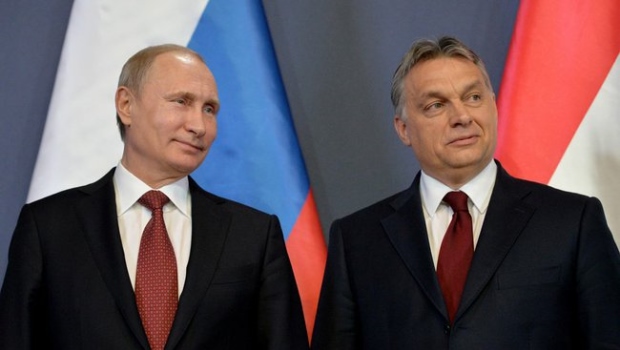Hungary
No arms deliveries to Ukraine – for the sake of the protection of Hungarians?

Earlier declarations of friendship towards Putin could endanger Viktor Orbán’s prospects in the election. However, no one should underestimate him.
Hungarian government under Prime Minister Orbán has expressed itself clearly against any arms shipments to Ukraine through the country. These actions fit into the picture of the inseparable friendship that connects Orbán to Putin for a long time now, and that has lead the Western intelligence to consider him as a certain security risk within NATO.
But on April 3, the Hungarian parliamentary elections will take place with the opposition being united in an alliance for the first time, thus having a good chance of winning the elections. And right here, Orbán's carefully cultivated Russophilia represents a possible risk for him. For Hungarians are by no means as anti-Western as it might seem keeping in mind Orbán's permanent rule. In a poll taken at the end of last year, 80% of Hungarians supported the country's NATO membership. Even 78% expressed themselves in favour of the EU membership. That is even one percent more than among the otherwise EU-friendly Estonians. And just as much as in Austria.
Until now, Orbán's friendship with Putin and his frequent anti-European rhetoric has never hurt him in terms of the electoral results, since this issue was not so much relevant for most Hungarians. However, since the Russian invasion of Ukraine, this is definitely no longer the case. On the contrary, Orbán's proximity to Putin could become a problem for him.
Cult of Victimhood over Trianon
This is a question of strategy. How does Orbán counter all of this? He decided for a time-tested strategy. The refusal to allow Hungary to be a transit country for arms shipments is not linked to any declaration of loyalty to Putin and Russia. His government even supports the negotiations regarding the Ukrainian entry into the European Union.
The focus is placed on the protection of Hungary. For years, Orbán has seen himself as the protector of all Hungarians outside the Hungarian territory as well. There are many of them, indeed. Orbán has always pursued a historical perspective in his politics, which emphasized the division of Hungary after the war with Romania and Czechoslovakia in 1919, which resulted in the 1920 Peace of Trianon, when the former 21 million country shrank into a country of just under 8 million inhabitants – the rest living in other countries. The shame from the past is still present and Orbán uses it to celebrate a patriotic cult of victimhood, thus legitimizing his political actions.
This is where Orbán adapts his current politics. In the Transcarpathian area in Ukraine, there lives a significant Hungarian minority of around 156,000 people, who make up 12.1% of the population there. Orbán has always played a role of an administrator for this minority and has often entered into conflict with the Ukrainian government, for example because of the Hungarian language teaching in Ukraine in 2018. Always with a clear intention: for in 2010 Orbán gave Hungarians living abroad the right to participate in the elections in Hungary itself. It paid off: in 2014, around 95% of them voted for Orbán's Fidesz party. In 2018, around 380,000 Hungarian voters living in Ukraine, Slovakia, Romania and other countries had participated in the election after all: they mainly voted for Orbán as well.
Harmed, But Not to Be Underestimated
Now, when Orbán publicly opposes the transit of weapons through his country by arguing that all of this is in order to protect the Transcarpathian Hungarians from the threat of war, the votes for him are secured there. Yet, it is likely that most voters in Hungary will see Orbán's argumentation as a distraction from his close political ties to Putin and a distraction from the close interconnection of Orbán's oligarchic environment to Putin's oligarchic environment. However, it is still a clever move, because the protection of Hungarians living abroad is actually mostly seen as a legitimate concern. Another important gain in the election could also represent the announcement of the Hungarian provision of humanitarian aid to Ukraine on an unprecedented scale of 600 million forints (approx. 1.54 million euros), which is mostly focused on the Transcarpathian area (with many Hungarians to protect). Of course, the probability that Orbán's stance on Ukraine and especially Russia will have a negative impact in this election still stands. Although his distraction manoeuvre fits into Orbán's successful (historical) narrative, it originated out of necessity. People do not forget past declarations of friendship towards Putin that quickly. Nevertheless, the example also shows that the opposition, whose chances are better than ever since 2010, cannot become careless. Orbán's strategic and political skills should not be underestimated.
Dr Detmar Doering is the project director of the Friedrich Naumann Foundation for Freedom's Central Europe and the Baltic States Office in Prague.
This article is part of the focus "Hungary Election Countdown", published by the Prague office of the Friedrich Naumann Foundation for Freedom.
